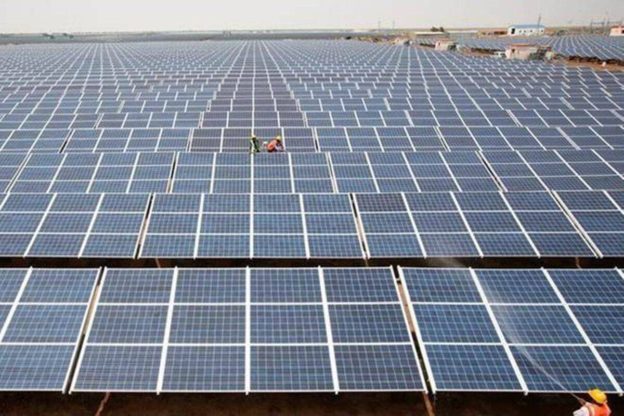Safeguard duty alone won’t be enough. The government must tackle financial limitations and R&D needs of domestic firms
It has been announced that India would levy a basic customs duty on import of solar cells and modules to further restrict imports and encourage domestic manufacturing. This is not a new development; in fact, a similar proposition earlier had led to a World Trade Organisation (WTO) case against the country. The Covid-19 pandemic has brought with itself a rising consciousness for locally-produced products, espoused in the new government mantra of Atmanirbhar Bharat. However, to compete with an established solar giant like China, India would need to provide more than just imposition of duties.
Under our forthcoming research, part of the ‘IDFC-ICRIER Project on Global Competitiveness of Indian Economy’, we found that the value of import for solar cells/photovoltaic cells has been rapidly falling. From a peak value in 2017-18, the current value of imports stands at just $128.8 million for April-July 2020. This was perhaps a result of the extension of previously imposed safeguard duty, in view of the pandemic and import restrictions. The solar sector albeit is an industry that relied heavily on imports, and such a drastic fall could prove to be detrimental for the sector.
Many reports and previous research have attributed the high import dependency to significantly lower cost of foreign modules in comparison to the local Indian counterparts. This high price of domestic modules can then actually be traced to a huge gap that still exists with respect to operational and technological capabilities between the local and foreign solar markets. The Ministry of New and Renewable Energy (MNRE) even acknowledged in a 2017 concept paper that the domestic capacity in the country was not utilised to the optimum capability due to “…obsolete technology as the existing capacity is mainly under the conventional technology of multi-crystalline Al-BSF solar cells…”
While the pandemic did bring back a renewed focus on the development of the domestic solar sector, it also brought to the fore limitations in the domestic setup. When the sector was already suffering from the disadvantages of high import dependency in the pre-Covid-19 era, the new restrictions coupled with a limited domestic reach have only added to its troubles.
The local content landscape
Different measures have been undertaken to deal with the issue of local competitiveness in the past few years. Two main initiatives include the domestic content requirement (DCR) and the imposition of anti-dumping duty in the solar sector.
Under the Jawaharlal Nehru National Solar Mission (JNNSM) in 2010, DCR was introduced to promote local manufacturing of solar PV. However, the DCR clause did not include thin film modules. The result was a majority of installations opting for low-cost financed imported thin film modules, in opposition of the domestic manufacturers majorly using crystalline silicon (c-Si) PV cells and modules.
As a result of this bias, the c-Si local manufacturing took a hit and the local demand fell. Further, the WTO considered DCR as inconsistent with rules of free and fair international trade. On this line, there was a dispute between India and the US, where the US dragged the DCR clauses to the WTO, claiming inconsistency with trade agreements. The end-result was an eventual scrapping of DCR. The DCR scheme in India was not a significant contributor to either improvement in competitiveness or job creation. In accordance to a CEEW-NRDC study, DCR actually even distorted the market towards thin film solar cell technology when the domestic manufacturing capacity for the same was limited.

The imposition of anti-dumping duty in 2018 was also met with a lot of criticism. In 2018, the Supreme Court gave a judgment on the imposition of safeguard duty on import of solar panels and modules from China and Malaysia. The said duty was put in place to restrict the invasion of cheap imports, believed to be hampering local business prospects. While recognising the need to protect local manufacturers, the industry, however, also feared an increase in costs for solar developers, leading to a rise in power tariffs.
Not just protectionist measures
With a limited and restricted domestic solar sector, it would be difficult to achieve a completely self-reliant domestic solar sector through only protectionist measures. Safeguard duty alone cannot serve to be enough. It requires a policy focus on a host of other factors such as financial limitations, facilitation of high-end technologies, skill development and training workshops, etc. Similarly, for provisions like DCR, involvement of different stakeholders, the private sector, and local and international businesses in the designing of such provisions can help in obtaining a clear strategy for catalysing local manufacturing.
Past research studies have demonstrated a failure of such measures when industry is sheltered from competition or is given protection to offset high costs. On the other hand, measures that succeed contribute to realisation of economies of scale and ultimately expose the sector to competition, balancing the incentives provided.
China has achieved the dominant position in the sector due to the policy of complete government support to the industry, along with a focus on technological advancement. Along with government support, an acknowledgment of the existence of a skills gap and adequate measures for its reduction are crucial to ensure effective operationalisation of domestic manufacturing endeavours.
India, thus, needs to focus on building domestic manufacturing capacities as well as increasing research in the field to tap innovative technologies. India could utilise the International Solar Alliance (ISA) platform to encourage cooperation and learning amongst solar-rich nations to develop a greener and more interdependent world, from a monopolised one-country control of the market and thus the entire sector.
https://www.financialexpress.com/opinion/indias-solar-story-is-atmanirbharta-that-easy-safeguard-duty-alone-wont-be-enough/2108590/lite/





